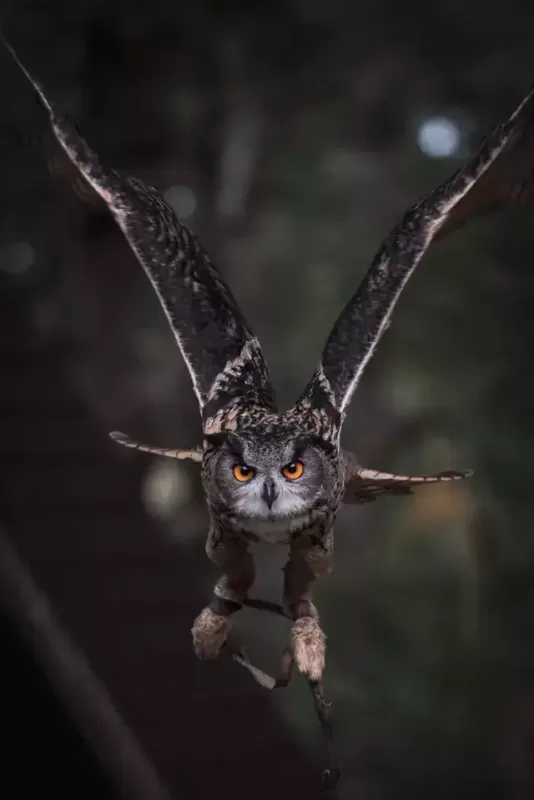Owl Care Guide
It takes an experienced bird keeper to manage a pet owl, but for those who are able to, this iconic bird can be an exciting and rewarding companion to have. Learn about Owl care here.
Owl Size:
The size of Owls can range from as little as 5 inches tall to about 2.5 feet at full maturity, and their wingspans can range from a foot to well over 6 feet in length. Most species of Owls are at the lower end of these ranges.
The lifespan of Owls ranges by species as well, from 10 years up to 30 years on average.
Owl Care:
Owls are raptors. Hunters. Birds of prey. Much like their cousin, the hawk. This is crucial to know and keep in mind before deciding to make an Owl the family pet. They’re not suitable for homes with children or other small animals which they may decide look like a tasty treat at any time.

They’re also not the cuddly or hands-on type of birds, preferring to spend most of their time in solitude, perched and conserving their energy for the next “hunt”.
Owls don’t have that “flock” mentality in the wild, and they won’t adopt it in captivity either. If human-imprinted from an early age they will bond with their keeper, but even this comes with certain concerns as Owls are known to become aggressive towards other humans who come around once they’ve bonded with a specific human.
This can be especially problematic if the owner becomes ill or wishes to travel on vacation, as the Owl may not respond well to anyone else caring for it during the time.
They also need lots and lots of space. To remain healthy and vibrant Owls must have room and opportunity to spread their wings and fly, even tethered flying, and they can’t just be kept in a large cage intended for bigger parrots.
Owls also need access to a clean bath pan constantly. They are frequent bathers to keep their feathers and wings clean which allows them to fly silently, an instinctual and handy skill for a bird of prey. If they become dirty their wings will actually make ruffled sounds when flying.
Owl Diet:
Unlike other pet birds, a diet of seeds, fruits, and vegetables won’t provide an Owl with its nutritional needs. These are carnivorous birds of prey that feed on other animals. A diet of rodents and small birds is necessary for them.
This alone makes them less than desirable as pets to many, though from our perspective it isn’t very different from keeping snakes or lizards who also feed on small animals, but this is something to consider as well before deciding to keep an Owl.
Owl Habitat:
As mentioned above, Owls have high space demands. There aren’t normal bird cages made that are large enough to keep them comfortable.
The best situation is an aviary or free-loft with both indoor and outdoor access or areas.
Provided that the owner is available to take the Owl outside daily for some flying and exercise time, this solution can work.
Owl Behavior:
Not cuddly at all, Owls can display a limited amount of affection towards their owners if they’ve bonded. Owls don’t have that natural flock mentality of most birds, but they do form deep monogamous relationships in the wild, and once bonded with a human keeper will view them as their “mate”.
Very independent, Owls are content to sit perched for hours on end just watching their surroundings. This is their natural behavior in the wild, to conserve energy for when they spot prey to swoop in on, and they’ll do the same in captivity as well.
Another consideration is that Owls are nocturnal, being most active at dusk and dawn. For an owner with a busy day schedule, this can prove to be a blessing, but the unusual hours of the bird can be draining for some.
Owl Care Conclusion:
Not good pets for most people, the Owl can make a wonderful companion for the right, experienced owner. We strongly advise anyone considering an Owl for their home to consult with a veterinarian and Owl specialist first to ensure your home is going to be adequate for the bird.
You should also check the legalities of keeping a pet Owl in your area as the laws tend to differ from one location to another.
Learn more about the variety and nuances of Owls here.
Nicholas Burns – Veterinary Technician, amateur Ornithologist
Nick has volunteered at bird rescues since he was a teenager and worked as a veterinary technician for almost two decades. He has extensive experience with animal care and a special love for birds, especially his African Grey, Scrooge (who knows all the bad words!).